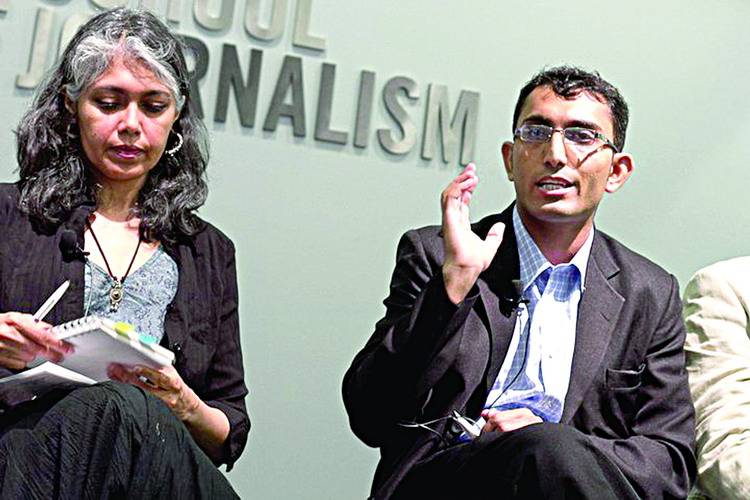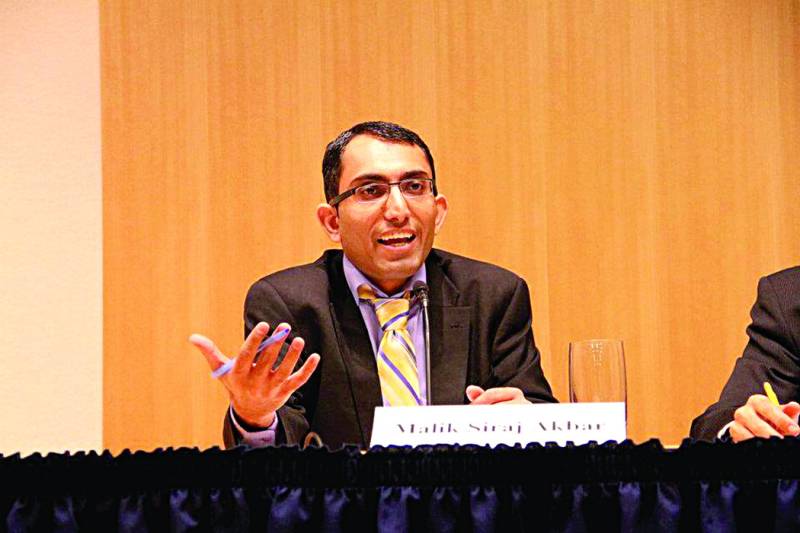Pakistani news channels are working 24/7. They are reporting on all the issues in which public is interested and in their hassle, they overlook the issues of public interest. Concerns like Balochistan crisis slip the sight unless some serious journalists with real urge to report come forward. Malik Siraj Akbar is one such name. He is the editor Baloch Hal, of the first online newspaper focusing on Balochistan.
I remember the latest tragedy when last year an earthquake hit the land of Balcohistan. As a result of the terrible jolts an island appeared on the coast city of Gawadar. Instead of reporting the plight of the victims, the mainstream media bombarded the images and videos of the small island in the province. The Baloch Hal and few other agencies came forward to bring to light the miseries of the people of the province which is the richest when it comes to natural resources and is the poorest when it comes to standard of living of the people. Siraj has been trying to report situation in Balochistan on all important issues.
I had first interaction with Siraj on twitter. I tried to open a link of Baloch Hal but what popped up on the screen was, “Surf Safely, The site you are trying to access contains content that is prohibited for viewership from within Pakistan.” Siraj and I, mentioned the then interior minister Rehman Malik in tweets to grab his attention to the topic. The effort was futile as the governments play deaf ear to freedom of expression. Sunday Plus had a conversation with Siraj. He shared his insight about Pakistan, and Balochistan crisis. We also discussed his book and how he is showing a skeptic yet resolute face of Pakistani youth. Following are excerpts of the interview:
How did you get into this profession?
My interest in journalism dates back to my early teens. I had always wanted to become a journalist because journalists influence public opinion and get to meet with different people. I have always been very extrovert and gregarious and journalism fits that kind of a lifestyle. I used to write short stories for children’s magazines in Urdu. At the age of 16, I started writing on cricket. Prime Sports, a Karachi-based weekly sports magazine, offered me a regular column which ran for a while.
I started my journalistic career in 2003. In 2006, after completing my post-graduation in journalism from the Asian College of Journalism in Chennai, India, I joined Daily Times as the Balochistan Bureau Chief. It was the peak time of the conflict between the government and the Baloch nationalists. It provided me an opportunity to interview top government and opposition leaders and report on the Baloch nationalist movement. In 2009, I founded the Baloch Hal, Balochistan’s first online English language newspaper. My articles have appeared in Foreign Policy, Chicago Tribune, Huffington Post, the Diplomat, Dawn, Express Tribune, The News International, Times of India, the Hindu, Frontline and many other publications.
What is the ideology behind Baloch Hal? What are the future plans?
The Baloch Hal is a liberal, hyper-local newspaper that exclusively covers stories related to Balochistan because we think there is either insufficient coverage of Balochistan in the mainstream Pakistani media or a lack of proper understanding of local perspectives. We endeavor to bridge that gap. We regularly work with young journalists and aspiring writers from remote parts of Balochistan who need career advice, mentorship and a platform to get their work published. The Baloch Hal is still evolving and shaping itself since the very concept of online journalism has not fully matured yet in our part of the world. The economic viability of an online newspaper, including ours, is still the biggest challenge we face that this time. We run The Baloch Hal voluntarily and we will have to find sustainable revenue to not only continue to publish the paper but also to improve its quality.
Tell us about your book. When did you start working on it? How was the response? Did you find it difficult to publish it?
I worked on my book in 2010-11 while I was completing the Hubert Humphrey Fellowship Program at Arizona State University. The book focuses on the changing dynamics of the Baloch nationalist movement. While Balochistan has had troubled relations with the federal government since 1948, what is unique about the ongoing nationalist movement is the widespread participation of the Baloch middle-class and women. This does not bode well for Pakistan and makes it hard for Islamabad to completely eradicate the nationalist movement when it enjoys so much public support. I self-published the book.
Are you working on any other book?
I am not currently working on a book but I intend to write my memoirs in near future. People may think I am too young or not-so-important to publish my autobiography. But the reason I want to write this book is to tell the story of my generation of the young Baloch. Our generation has been the prime victim of the conflict in Balochistan. I have lost numerous personal friends in the ongoing war. Young boys of my age faced extrajudicial arrests, torture and murder all these years.
I have lived on exile for nearly five years without having met my family even once during these years. There seems to be no safe place for young Baloch people within Pakistan. Who on the earth goes to a war-torn country like Afghanistan to seek protection and asylum? You may laugh and say no one but in fact thousands of Balochs are even compelled to go to Afghanistan for protection. It has been too hard to be a young Baloch in Pakistan in recent times. Besides politics, people of my age in the rest of Pakistan know nothing about the Baloch people as to how we live, what we eat and how we spend our lives. Even once a former Pakistani senator asked me, “Siraj, what language do you people speak in Balochistan? Balochistani?” I see a major disconnect between our generation of people from Balochistan and the rest of the country.
Why did you leave Pakistan?
I left Pakistan to work on the Hubert Humphrey Fellowship Program in 2010-11. But I did not return after the completion of my fellowship because the government blocked the Baloch Hal in November 2010 and violence against journalists significantly increased in Balochistan. Journalists’ safety has today become a Pakistan-wide challenge for our community. If you are a Baloch journalist and attacked then you are very unlikely to get the kind of attention Syed Saleem Shahzad, Umer Cheema, Hamid Mir or Raza Rumi received. So, if you are a Baloch journalist, you have to be smart enough to draw a line between stupidity and bravery because there is no one from the Pakistani government or the media to cry for you once you disappear or are killed.
How do you see Baloch problem? Give a brief review?
The Baloch problem has complicated in the recent times. In the past, it seemed to be a mere issue of provincial autonomy. Violence, intolerance has increased and the State has failed to fulfill its obligations to protect people’s lives and meet their fundamental socio-economic needs. The Balochs had been agitated in the past for not benefitting from their mineral wealth but now their anger is further fueled by use of force against the Baloch people. The government needs to take urgent but drastic measures to normalize Balochistan. The Center has to devise a policy of long-term engagement and ownership of the Baloch in order to make them equal partners in the affairs of the State. The sooner Islamabad does so, the better for a conflict management and resolution.
Do you see any hope in case of Pakistan? What are the most important problems?
Pakistan has invested more in religion than investing in its economy. Pakistan needs robust economic and social reforms to ignite hope among its people. In the 21st century it is more important to know how many of your countrymen are fed, educated, and employed than knowing who is a Sunni or a Shia. It should take advantage of the great economic progress its neighbours China and India are making. It is unfortunate for Pakistan that China and India are currently negotiating with the world’s top investors and inviting leading global universities to open their campuses over there and Pakistan is stuck with negotiating with the Taliban and offering it an office. It does not mean that Pakistan has totally missed the bus but it can no longer afford to squander more time if it intends to progress and prosper.
On cultural front Pakistan is lagging far behind, Balochistan in particular is further away on cultural progress. Many believe that cultural power can help resolve many crisis. Do you think soft power can help?
Pakistan is home to diverse cultures. Instead of capitalizing on that cultural heritage, we imposed a single Muslim-Pakistani-Urdu-speaking cultural identity on the whole country. Unlike India, Pakistan did not allow mother tongues and regional languages to flourish. As a result, local art, literature, music and cultural practices did not find ample space to flourish. Once we learn to appreciate cultural diversity, we will become a more tolerant and pluralistic country. Cultural freedom and practices can tremendously bridge gaps between various groups fighting in the name of religion and ethnicity. People in one Pakistani province hardly know anything about the cultural icons of the other provinces. We should utilize our private television channels to bridge that cultural gap and promote mutual understanding among our people.








